10 Best WhatsApp Alternatives in 2025: Secure Apps
Facebook's acquisition of WhatsApp left privacy experts and security-conscious users concerned. After all, Facebook and its third-party apps were involved in multiple security breaches, resulting in thousands of users' private information being leaked. However, WhatsApp has always insisted that it is a separate app dedicated to creating and maintaining a secure messaging service.
That's about to change. Facebook recently announced that it’s considering merging three separate messaging platforms. It plans to combine Facebook Messenger, WhatsApp, and Instagram's message functions, allowing users to message each other between the three networks. While this move could offer convenience, it also raises significant privacy and security concerns. So, no wonder you're looking for a WhatsApp replacement.
Whether you're searching for messaging apps that prioritize security and privacy, are open-source, operate outside the Facebook ecosystem, function in restrictive countries, or offer enhanced customization, you're in the right place. Explore the top alternatives to WhatsApp that cater to your specific needs.
Best WhatsApp Alternatives
Given the issues with WhatsApp, it’s better to look for services that not only offer robust encryption but also have a transparent approach to how they handle user data and privacy. Here are some great options to consider:
1. Signal
Signal is a highly secure messaging app that stands out from WhatsApp due to its stronger commitment to privacy and security. It uses end-to-end encryption for all messages and calls by default, ensuring that only the communicating users can read the messages, while WhatsApp only uses end-to-end encryption for messages but still collects extensive metadata and shares it with Facebook.
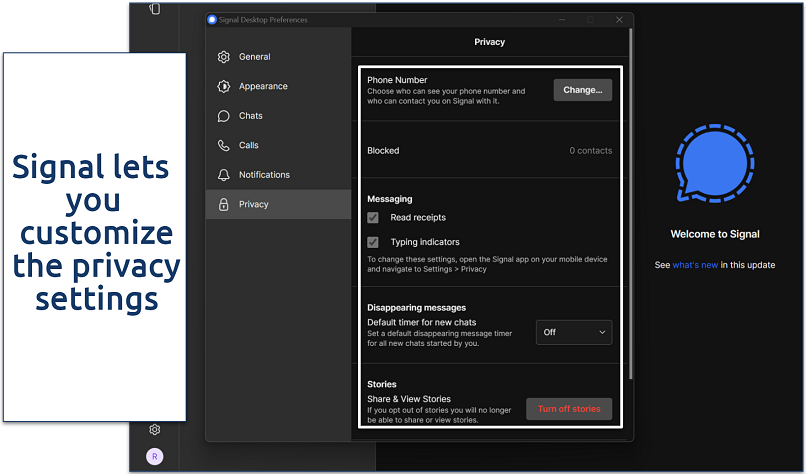 You can turn on disappearing messages and read receipts in the settings panel
You can turn on disappearing messages and read receipts in the settings panel
Plus, Signal offers additional privacy features that WhatsApp lacks, such as disappearing messages, view-once media, and the ability to use Signal without linking it to your phone's SMS service. Signal also supports encrypted stickers and allows users to verify their contacts' identity through safety numbers.
The app is available on Android, iOS, Windows, Mac, and Linux and was developed by the Signal Foundation, a non-profit organization, which adds to its credibility as a privacy-focused communication tool. It's led by Moxie Marlinspike and Brian Acton (WhatsApp co-founder Brian, who left Facebook in 2017 after a public dispute over WhatsApp's future).
| Pros | Cons |
|---|---|
| Enhanced privacy and security | Fewer users compared to other platforms |
| Open-source and non-profit | Limited features beyond messaging and calling |
2. Telegram
Telegram is a cloud-based app that offers fast and secure messaging. One of its standout features is the support for large group chats, accommodating up to 200 thousand members, which is significantly higher than WhatsApp's limit of 1,024 participants. This makes Telegram ideal for community building and large-scale communication.
Telegram also features a powerful file-sharing capability, supporting files up to 2GB in size, and an Instant View function that allows users to read articles with zero loading time. Besides, Telegram channels allow you to broadcast messages to unlimited subscribers, making it a valuable tool for content distribution and public announcements.
You can set messages to self-destruct, create bots for automation, and use public channels for broadcasting. Plus, the app is free to use across all platforms. While it provides optional end-to-end encryption in Secret Chats, its regular chats are encrypted only between the client and the server.
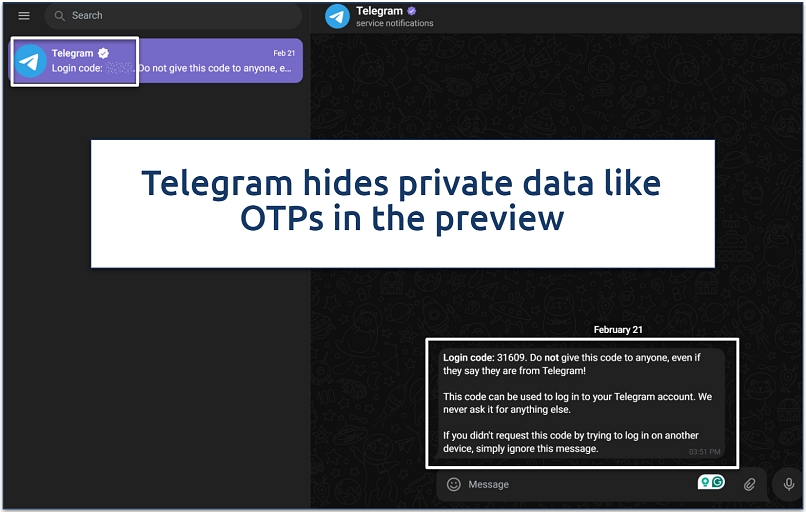 You can set up Telegram on your PC or just use it on a web browser
You can set up Telegram on your PC or just use it on a web browser
| Pros | Cons |
|---|---|
| Large group and channel capabilities | The end-to-end encryption is not default for all messages |
| Fast, cloud-based, works on multiple platforms | Potential for misinformation and abuse — Telegram has been criticized for being a platform where misinformation can spread quickly and illicit activities can be coordinated |
3. Discord
Discord is a robust communication platform designed primarily for creating communities. Unlike WhatsApp, which focuses on individual and group messaging, Discord provides extensive tools for community building and collaboration.
Although widely associated with gaming, Discord is also extensively used for educational purposes, professional team collaboration, and community building across various interests. Users can create servers, which are dedicated spaces for communities with multiple channels for text, voice, and video communication. These servers can be customized extensively, allowing for different roles, permissions, and integrations with other apps and bots.
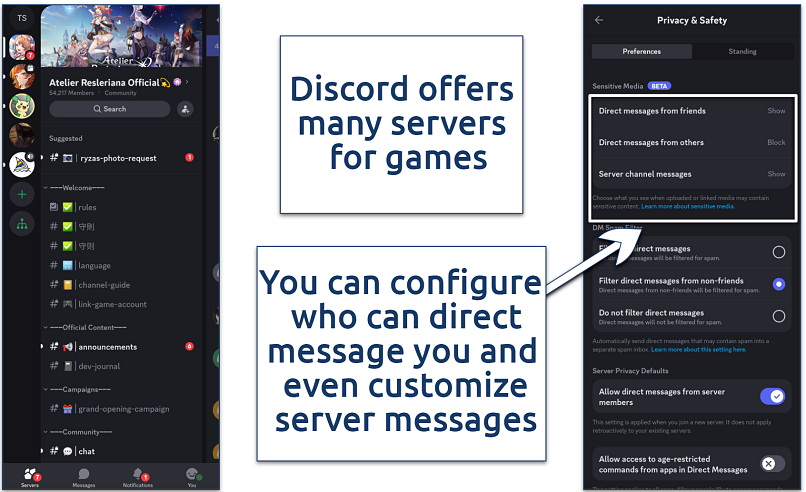 Discord lets you join multiple servers and customize who can message you
Discord lets you join multiple servers and customize who can message you
Discord's voice chat capabilities are particularly noteworthy. It supports high-quality, low-latency voice communication, making it ideal for gamers and professional teams. Additionally, Discord includes features like screen sharing, live streaming, and extensive support for media sharing, which go beyond the simpler functionalities of WhatsApp.
| Pros | Cons |
|---|---|
| Comprehensive community features | Can be complex for new users |
| Advanced voice and video capabilities | Primarily gaming-focused, though expanding to broader uses |
4. Viber
Viber provides end-to-end encryption for all communications, including calls, messages, and shared media, ensuring a high level of privacy. One of its standout features is Viber Out, which allows users to make low-cost international calls to non-Viber users, a service WhatsApp doesn’t offer.
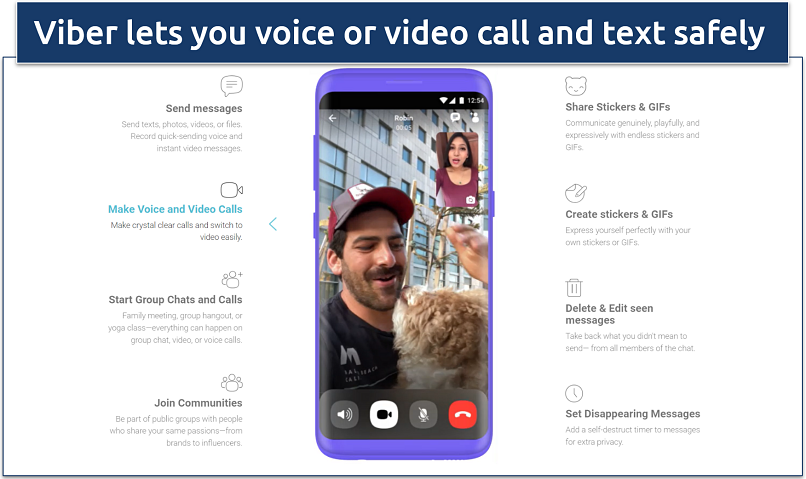 You can also do group calls or set disappearing messages with Viber
You can also do group calls or set disappearing messages with Viber
Additionally, Viber supports public chat communities and channels, allowing you to join and participate in large group discussions and follow content from various sources, providing a social media-like experience within the app.
It’s available on Android, iOS, Windows, and Mac and supports syncing across devices, ensuring you can access your conversations and call history on any device.
| Pros | Cons |
|---|---|
| Public chats and channels | Less popular in some regions |
| Viber Out for international calling | Some features are paid |
5. Threema
Threema is a secure messaging app focusing on privacy. It doesn’t require an email address or phone number to register, and you are given a unique Threema ID when you sign up. The app provides end-to-end encryption for all types of messages, calls, and even file transfers.
Threema generates and retains minimal metadata, deleting messages from its servers immediately after delivery. In contrast, WhatsApp collects and stores user metadata, which it shares with its parent company, Facebook.
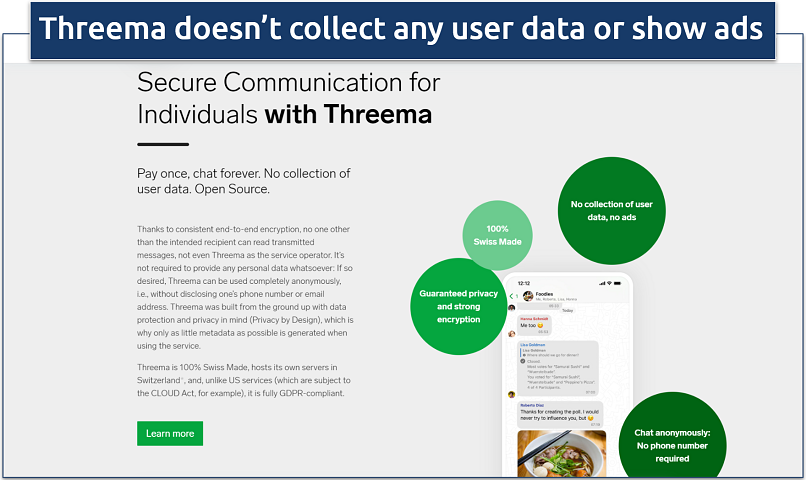 Threema doesn't share or sell your data to anyone
Threema doesn't share or sell your data to anyone
Despite its strong privacy features, Threema's recognition outside Switzerland is limited, and its $3 price tag may be a hurdle for widespread adoption.
| Pros | Cons |
|---|---|
| Strong privacy features and end-to-end encryption | Paid app, which may deter some users |
| No need for personal information to sign up | Smaller user base compared to mainstream apps |
6. Kik Messenger
Kik Messenger allows you to sign up with just an email address and doesn’t require a phone number. This enhances anonymity by letting you and others communicate through usernames rather than phone numbers. The app is easy to use, featuring interactive elements like built-in bots, games, and streamer interactions that make it more engaging than many other messaging platforms.
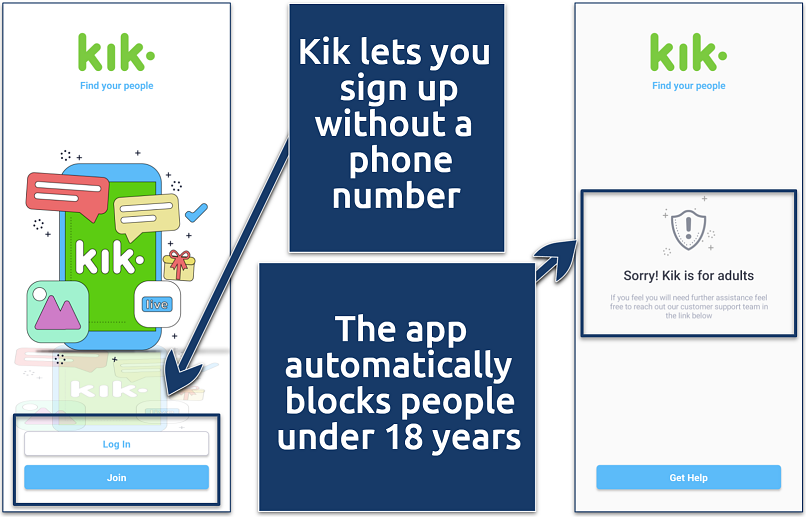 You can register with a burner email for added privacy
You can register with a burner email for added privacy
Available exclusively on Android and iOS, Kik caters to a dedicated and niche audience. It offers basic functionalities such as texting, photo, and video sharing but also introduces innovative features like cryptocurrency integration, adding a unique twist to its interactivity.
| Pros | Cons |
|---|---|
| Excellent privacy with no phone number required for signing up | Limited to mobile platforms with no desktop support |
| Interactive bots and innovative features | Lack of advanced security measures, such as end-to-end encryption |
7. Wire
Wire is a secure messaging and collaboration app. It offers unique collaboration features, including secure file sharing, group chats, and the ability to integrate with other tools, making it suitable for both personal and professional use. The app supports multi-device syncing and offers a sleek, modern interface.
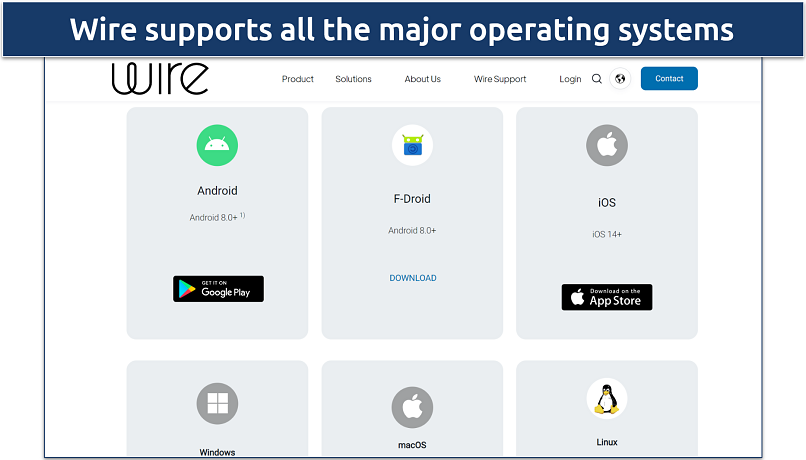 You can download Wire for free or upgrade to a premium plan for business needs
You can download Wire for free or upgrade to a premium plan for business needs
One of its primary advantages is its strong focus on privacy and security. Wire employs end-to-end encryption for all messages, calls, and shared media so only the intended recipients can access the content. The app is fully open-source, allowing for regular security audits and transparency about its privacy practices.
| Pros | Cons |
|---|---|
| End-to-end encryption for all communications | Business-oriented features can require a learning curve |
| No phone number required | Limited free version |
8. Element
Element is a secure messaging and collaboration app built on the open-source Matrix protocol. Unlike WhatsApp, it provides users with the option to host their own data, giving them complete control over where their messages and data are stored. Its decentralized nature means that you’re not reliant on a single service provider, making it resistant to censorship and central control.
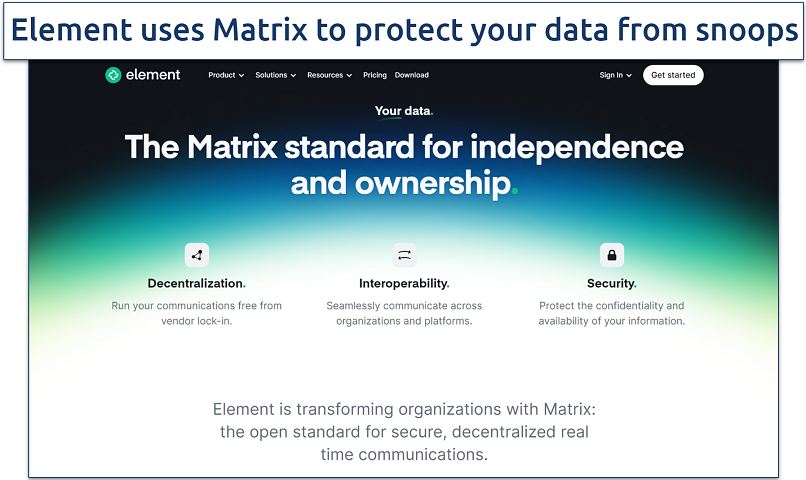 The app maintains greater privacy and anonymity compared to WhatsApp
The app maintains greater privacy and anonymity compared to WhatsApp
Element doesn’t require a phone number for registration — you can create an account with a username. It also supports extensive collaboration features, such as secure group chats, file sharing, and integration with other tools.
| Pros | Cons |
|---|---|
| Decentralization and interoperability | Complex setup for non-technical users |
| Data sovereignty and control | Niche user base compared to mainstream apps |
9. iMessage
iMessage is Apple's proprietary messaging service that is deeply integrated within the Apple ecosystem, providing a seamless experience across iOS, macOS, and watchOS devices. This integration allows users to send texts, photos, videos, and documents more effortlessly between Apple devices.
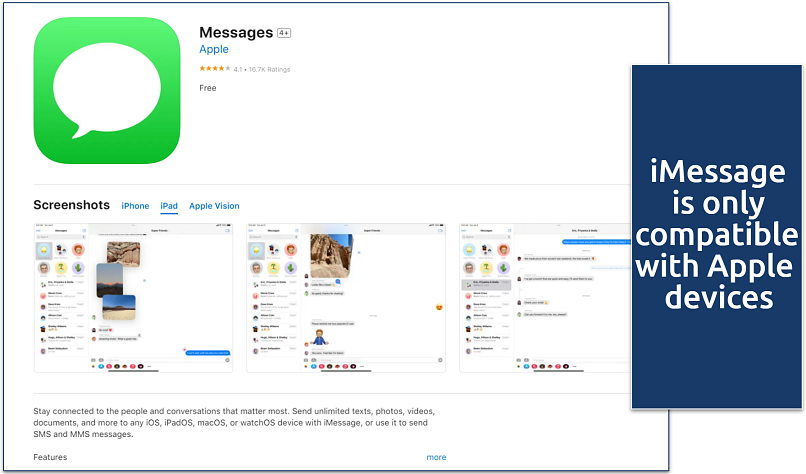 iMessage supports Apple Pay, letting you send and receive money directly within the messaging app
iMessage supports Apple Pay, letting you send and receive money directly within the messaging app
iMessage also includes unique features like Animoji and Memoji, which allow users to send animated emojis and create personalized avatars, adding a fun and expressive dimension to messaging. These features leverage Apple's advanced facial recognition technology, offering a level of interactivity and personalization not available on WhatsApp.
| Pros | Cons |
|---|---|
| Seamless integration with the Apple ecosystem | Limited to Apple devices |
| Advanced and fun messaging features | Dependence on internet and SMS integration |
10. Google Messages
Google Messages is a robust messaging app that integrates Rich Communication Services (RCS) to offer a more advanced and secure texting experience compared to traditional SMS. It has features such as typing indicators, read receipts, high-quality media sharing, and improved group chat capabilities.
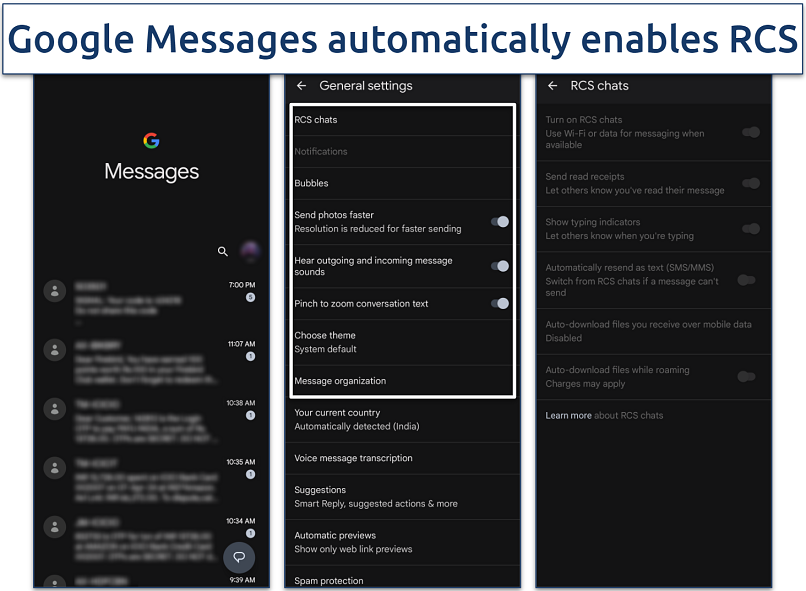 You can customize the RCS options, change the theme, and set the notification sounds
You can customize the RCS options, change the theme, and set the notification sounds
Magic Compose is an AI-powered feature that allows users to generate contextual replies and reword messages in various styles, providing enhanced communication options. Additionally, Google Messages supports custom reactions with Photomoji, where you can turn photos into emoji-like reactions, adding a personal touch to your interactions.
| Pros | Cons |
|---|---|
| Wide compatibility with Android devices and integration with Google services | SMS-based communication lacks end-to-end encryption |
| Supports advanced RCS messaging features | RCS features dependent on the carrier and regional support |
Quick Comparison Table: WhatsApp Alternatives Features
The comparison covers key aspects of WhatsApp alternatives such as cost, phone number requirements, platform availability, unique features, and their operability in restrictive countries (such as the UAE, India, Saudi Arabia, and Pakistan). This detailed analysis helps you make informed decisions about the best messaging app to suit your needs.
| WhatsApp alternative | Free to use | Phone number required | Compatible with | Works in restrictive countries (the UAE, India, Saudi Arabia, Pakistan) | Unique features |
| Signal | ✅ | ✅ (required for registration) |
Android, iPhone, Windows, macOS, Linux | Often blocked in the UAE and occasionally in other countries | Note to Self (send messages to yourself), incognito keyboard mode, secure group calls |
| Telegram | ✅ (with a premium tier offering additional features) |
✅ (but communication can be done using usernames) |
Android, iPhone, Windows, macOS, Linux, web | Accessible in India and Pakistan but faces periodic bans or restrictions in the UAE and Saudi Arabia | Large group chats (up to 200,000 members), public channels, Telegram Passport for secure document storage, Instant View for articles |
| Discord | ✅ (with a Nitro subscription for additional features) |
❌ | Android, iPhone, Windows, macOS, Linux, web | Works in Pakistan, occasionally restricted in India, voice services blocked in the UAE and Saudi Arabia | Community building with channels and servers, gaming integrations, media sharing, bots |
| Viber | ✅ (with in-app purchases) |
✅ (required for registration) |
Android, iPhone, Windows, macOS, Linux | Often blocked or restricted in the UAE and Saudi Arabia but generally accessible in India and Pakistan | Public chat communities, Viber Out for calling non-Viber users |
| Threema | ❌ | ❌ | Android, iPhone, web | Generally works well, but accessibility can vary | Anonymity, polls within chats, verification levels for contacts |
| Kik Messenger | ✅ (with in-app purchases) |
❌ | Android, iPhone | Usually accessible but can be blocked | Emphasis on anonymity, built-in web browser, public group chats |
| Wire | ✅ (paid plans for businesses) |
❌ | Android, iPhone, Windows, macOS, Linux, web | Works well in most regions | Supports guest rooms for temporary conversations, timed messages, and multiple accounts |
| Element | ✅ (with optional paid services) |
❌ | Android, iPhone, Windows, macOS, Linux, web | Generally accessible | Bridges to connect with other messaging services, decentralized nature enhances privacy and control |
| iMessage | ✅ | ✅ (or an Apple ID) |
iPhone, iPad, macOS | Generally accessible, though Apple's services can face restrictions (e.g. Face Time is restricted in the UAE and Saudi Arabia) | Integration with the Apple ecosystem, effects and animations, Apple Pay for peer-to-peer payments |
| Google Messages | ✅ | ✅ | Android, limited web access | Works well in most countries, but RCS functionality might be limited in some regions without Google services | Integration with Google services, Smart Reply, Google Assistant |
Pro Tip: In countries with strict internet restrictions, a VPN can be a lifesaver. It helps you bypass blocks on messaging apps by routing your connection through servers in other countries, enabling unrestricted and private communication. Check out our detailed guides:
Is WhatsApp Really Safe?
WhatsApp does offer end-to-end encryption, meaning that when you send a message, it's scrambled into a code that only the recipient's device can decode. This is a strong point in its favor, as it keeps your chats safe from prying eyes. However, it's important to remember that no platform is entirely foolproof.
While your messages are secure during transit, other vulnerabilities might exist. For instance, WhatsApp backs up chat histories to cloud services like Google Drive or iCloud, which aren't encrypted in the same way. This creates a potential access point for hackers. Additionally, the app is owned by Facebook, a company with a mixed track record on user privacy, raising concerns about data handling and sharing practices.
In countries with strict surveillance laws, authorities might legally request access to your data, and while WhatsApp itself can't read your encrypted messages, metadata (like who you're talking to, when, and for how long) can still be shared.
In essence, while WhatsApp offers a good level of security for everyday use, those needing higher security levels might consider other apps with a more stringent approach to privacy. Always weigh the benefits against potential risks to make the most informed decision about your digital communication tools.
Tips for Choosing the Best WhatsApp Alternatives
By considering these factors, you can find a WhatsApp alternative that balances functionality with the privacy and security you need.
- Privacy and security. Look for apps that offer end-to-end encryption by default to ensure your messages are secure. Verify the app's privacy policy to understand how your data is handled and stored.
- Data collection practices. Choose apps with transparent data collection practices. Some apps collect minimal data and have no ties to larger tech conglomerates, thus reducing the potential for data sharing.
- User experience. The alternative should be user-friendly and provide a seamless transition from WhatsApp. Check if it supports features like group chats, voice and video calls, media sharing, and cross-platform compatibility.
- Open source and independent audits. Apps that are open-source and undergo regular independent audits demonstrate a commitment to security and transparency.
- Popularity and user base. While privacy is crucial, so is connectivity. Look for apps with a significant user base to ensure you can communicate with as many contacts as possible.
- Feature set. Evaluate whether the app meets your needs in terms of features like message destruction, anonymity, and sticker packs and whether it supports business use if needed.
- Compatibility. Ensure the app is compatible with your device and operating system. Cross-platform support is essential if you communicate across different devices.
- Regulatory compliance. The app should comply with relevant data protection regulations like GDPR, ensuring your data rights are respected.
FAQs on Best WhatsApp Alternatives
Is there a safer alternative to WhatsApp?
Yes, there are safer alternatives to WhatsApp that prioritize user privacy and data security. Signal is one of the most recommended alternatives due to its strong encryption protocols, open-source software, and policy of collecting minimal user data. Other options include Telegram and Threema, which also focus on providing secure and private communication channels.
Is FM WhatsApp safe?
FM WhatsApp is not considered safe as it’s a modified version of the official WhatsApp application. This mode isn't recognized by WhatsApp, and it can compromise the security and privacy of your data. Using FM WhatsApp also poses a risk of getting your original WhatsApp account banned. So, it's better you use other WhatsApp replacements to stay safe online.
Is Signal better than WhatsApp?
Signal offers superior privacy and security features, such as end-to-end encryption for all forms of communication and open-source code for transparency. However, WhatsApp has a larger user base and more integrated features like payment services. If privacy and security are your main concerns, Signal might be the better choice.
Are there 2 types of WhatsApp?
Yes, there are two official types of WhatsApp: WhatsApp Messenger and WhatsApp Business. WhatsApp Messenger is designed for personal use, offering features like text messaging, voice, and video calls. WhatsApp Business is tailored for companies and includes additional features like business profiles, automated messages, and customer segmentation. Wire is another messaging app dedicated to personal and business use.
Can I install 2 WhatsApp on one phone?
Yes, you can install two WhatsApp accounts on one phone using features like dual apps, app cloning, or parallel space offered by many smartphones. Plus, if your phone supports dual SIM cards, you can use the official WhatsApp Business app alongside the regular WhatsApp Messenger to have two active accounts. You can also use WhatsApp with other messaging apps.
Why is WhatsApp GB banned?
WhatsApp GB is banned because it is an unofficial version of WhatsApp that violates the app's terms of service. It is not developed or authorized by WhatsApp, and using it can lead to security risks and privacy issues. Plus, WhatsApp actively discourages the use of such third-party apps by banning accounts that use them. So, you should stick to WhatsApp alternatives or the official WhatsApp app.
What is the WhatsApp alternative that works without a phone number?
Threema is one of the WhatsApp alternatives that work without a phone number. The app allows you to create an account with a Threema ID and provides messaging, voice, and video call services. Other WhatsApp replacements that work without a phone number are Discord, Kik, Wire, and Element.
Wrapping Up
While WhatsApp remains a popular choice for global communication, several alternatives offer enhanced privacy, unique features, and sometimes better security. Whether you're looking for more anonymity, freedom from corporate oversight, or just a fresh way to connect, there's likely an app on this list that meets your needs. As with any app, consider what's most important for your communication needs and security to make the best choice.
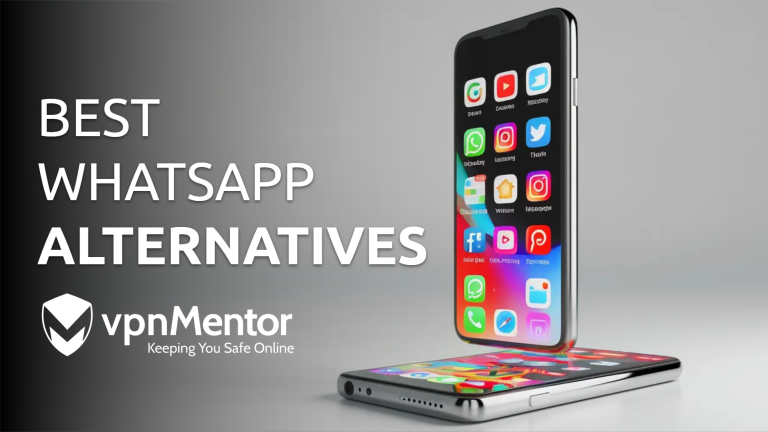


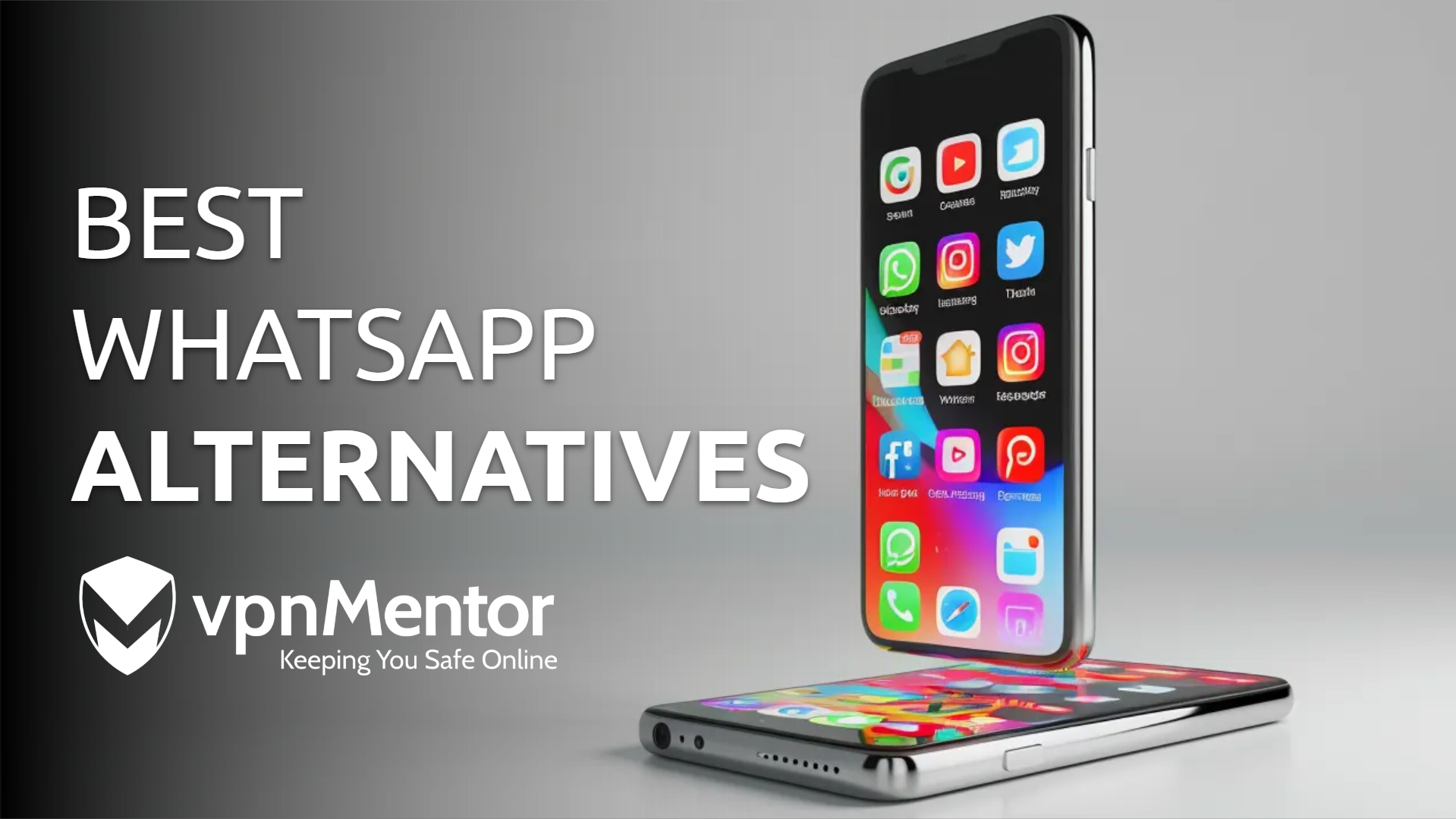

Please, comment on how to improve this article. Your feedback matters!